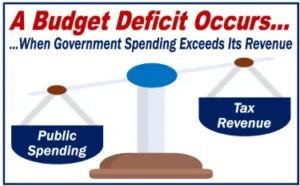Description: Federal Deficits
Discover how debunking myths about deficits can help Australia create a compassionate political system using its monetary sovereignty.
Introduction
 The fear of deficits is a common narrative used by politicians to justify austerity measures and cuts to social services. However, this fear is often based on myths and misunderstandings. Stephanie Kelton’s book, “The Deficit Myth,” provides a comprehensive analysis of these misconceptions, revealing how a proper understanding of government spending can lead to more effective and compassionate public policy.
The fear of deficits is a common narrative used by politicians to justify austerity measures and cuts to social services. However, this fear is often based on myths and misunderstandings. Stephanie Kelton’s book, “The Deficit Myth,” provides a comprehensive analysis of these misconceptions, revealing how a proper understanding of government spending can lead to more effective and compassionate public policy.
Understanding the Deficit Myth
Defining the Deficit Myth
The deficit myth is the belief that federal government budgets work like household budgets, needing to balance income (taxes) and expenses (spending). Stephanie Kelton argues that this analogy is incorrect for countries with monetary sovereignty, such as Australia. These countries can create money to fund their spending, meaning they are not constrained by tax revenues in the same way households are.

Historical Context
The fear of deficits has not always been prevalent. After World War II, many countries used deficit spending to rebuild their economies. However, in recent decades, neoliberal policies have emphasized the need for balanced budgets and austerity measures. This shift has led to a reduction in public investment and social services, often harming economic stability and growth.
Common Myths About Deficits
 Myth 1: Taxes Fund Government Spending
Myth 1: Taxes Fund Government Spending
The belief that taxes directly fund government spending is widespread. Politicians argue that higher taxes are necessary to fund public services, leading to resistance against tax increases and public spending. However, in countries with monetary sovereignty, taxes serve other purposes. They help manage inflation and redistribute wealth but are not the primary source of government funds. The government can create money to fund its spending, making the direct link between taxes and spending a myth.
Myth 2: Borrowing Burdens Future Generations
Another common myth is that government borrowing today will place an unbearable debt burden on future generations. This belief leads to resistance against borrowing for public investment and social programs. However, government borrowing does not work like household debt. For a sovereign currency issuer, borrowing is a tool for managing the economy, not a burden that needs to be repaid in the same way personal loans are. Future generations will inherit the benefits of public investments made today, such as improved infrastructure and social services.
Myth 3: Deficits Are Harmful and Unsustainable
 Many believe that deficits lead to economic instability and should be avoided. This belief drives austerity measures and cuts to essential services. However, deficits can be beneficial, especially when used to fund public investments that stimulate economic growth. Stephanie Kelton argues that deficits are not inherently bad and can be a tool for economic stability. She highlights examples where deficit spending has led to positive outcomes, such as the New Deal in the United States and post-war reconstruction in Europe.
Many believe that deficits lead to economic instability and should be avoided. This belief drives austerity measures and cuts to essential services. However, deficits can be beneficial, especially when used to fund public investments that stimulate economic growth. Stephanie Kelton argues that deficits are not inherently bad and can be a tool for economic stability. She highlights examples where deficit spending has led to positive outcomes, such as the New Deal in the United States and post-war reconstruction in Europe.
Political Manipulation of Deficit Fears
Spin and Misinformation

Politicians often use deficit fears to influence public opinion and policy. By framing deficits as dangerous, they justify cuts to social programs and avoid raising taxes on the wealthy. This manipulation has real consequences. Essential services like healthcare, education, and infrastructure suffer from underfunding due to unnecessary deficit fears.
Impact on Social Services
The manipulation of deficit fears has a significant impact on social services. Politicians argue that deficits must be controlled to avoid economic disaster, leading to cuts in public spending. This results in underfunded healthcare, education, and infrastructure, harming the most vulnerable in society. By understanding the true nature of deficits, we can advocate for policies that prioritize public well-being over unnecessary austerity.
The Reality of Deficits
Government Spending Mechanics
In a country with monetary sovereignty, the government can create money to fund its spending. This ability allows for greater flexibility in addressing economic needs without relying solely on tax revenues. Understanding this concept is crucial for debunking the myths about deficits. Government spending does not depend on tax revenues, and deficits do not pose the same risks as household debt.
Economic Benefits of Deficits
Deficits can be beneficial for the economy. They allow for investments in public services, infrastructure, and social programs that stimulate economic growth and improve quality of life. Deficits can also help manage economic downturns by providing necessary funds for public investment. By understanding the benefits of deficits, we can advocate for policies that prioritize public well-being over unnecessary austerity and dispel the “deficit myth“.
Case Studies and Real-World Examples
Successful Use of Deficits
Countries like Japan and the United States have effectively used deficit spending to manage their economies. Japan has maintained high levels of public debt without experiencing economic collapse. The United States used deficit spending during the New Deal to recover from the Great Depression and during World War II to fund the war effort. These examples show that deficits are not inherently bad and can be a tool for economic stability.
Australia’s Current Situation
In Australia, deficit fears have led to underfunding in crucial areas. By understanding and dispelling these myths, Australia can better use its monetary sovereignty to improve public services and economic health. Australia’s current approach to deficits has led to cuts in social services and public investment, harming the most vulnerable in society. By understanding the true nature of deficits, we can advocate for policies that prioritize public well-being over unnecessary austerity.
Conclusion
Summary of Key Points
The myths surrounding deficits are powerful but misguided. Understanding the truth about government spending can lead to more informed public policy and a better quality of life for all Australians. Deficits are not inherently bad and can be a tool for economic stability. By understanding the true nature of deficits, we can advocate for policies that prioritize public well-being over unnecessary austerity.
Call to Action
It’s time to question the narratives about deficits and advocate for policies that prioritize public well-being over unnecessary austerity. Share this article to spread awareness and join the conversation on how Australia can use its monetary sovereignty for good.
Thought-Provoking Question
How might our understanding of public finance change if we dispelled the myths about deficits?
Social Sharing
Share this article with your contacts and on social media to help debunk the deficit myths and promote a more informed and compassionate political system.
By dispelling the myths about federal deficits, we can move towards a more compassionate and ethical political system that prioritizes public well-being. Understanding the true nature of deficits and government spending is crucial for creating a more just and fair society.
Refernences:
The Australian Institute: https://australiainstitute.org.au/?s=Modern+Monetary+Theory

